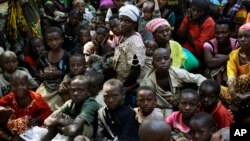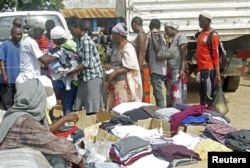A fresh wave of Burundian refugees has entered Uganda this month amid concerns that violence in Burundi is escalating. New arrivals say they fled after pro-government militia and security forces targeted their families.
The Nakivali Refugee Settlement in southwestern Uganda is home to refugees from all over Central Africa.
Ugandan officials say that in the past two weeks, about 50 Burundians per day have declared themselves at the border. They suspect the actual number of people arriving is higher, due to some bypassing official checkpoints.
At Nakivali, the Burundians have carved out an area they're calling “New Bujumbura." Many recent arrivals tell a similar story: They say that although they weren't involved in anti-government protests or the political opposition, just knowing someone who was put them in danger.
Faisail Singirankabo, a 40-year-old car salesman, said he fled after the ruling party's Imbonerakure militia killed his parents.
He said he isn't political but his parents were in the opposition. When they were killed, he said he became afraid, and not long after he left.
Janine Kanyamuneza said she fled Bujumbura after her husband and neighbors were killed by militia. She said while the neighbors were opposition members, her husband had only declined to join the ruling party.
She said that while sneaking over the border, she was afraid of being killed by militias. She first went to Rwanda, where other Burundians helped her get to Uganda. She said that she went under the cover of night because she was so afraid. Even today, she said, she is still scared of Imbonerakure because she heard they are coming to Nakivali.
Ugandan authorities say many refugees worry about this – that militia are pursuing them or watching them in Uganda. The refugee desk officer at the camp said although it is a concern, police and intelligence officers are screening new arrivals and keeping a close watch.
Asha Bucunyibuka, a merchant from Bujumbura, said she has been on the run since October. The government arrested her brother, a ruling party member.
She said he escaped and government forces started going after his family. They first moved from house to house in Bujumbura and then up country, but the government kept finding them. So, she said, they escaped into Rwanda. Yet even there, the militia tried to find her so she fled again. In the confusion, she was separated from her husband and five children.
The violence in Burundi began in April amid resistance to President Pierre Nkurunziza's bid for a third term. The U.N. has said at least 240 people have been killed since then.
The government has blamed the continued violence on "criminals" and opponents of the regime. A presidential spokesman did not answer calls for comment Wednesday.
The U.N. refugee agency says 216,000 Burundians have fled the country. Just over 15,000 are registered in Uganda. The increase has strained Uganda's refugee program, which is also assisting refugees from South Sudan and the D.R.C.
The African Union and the U.N. Security Council have stepped up pressure for regionally mediated talks to end the crisis. The Burundi government says it is in favor of a national dialogue, though so far no formal arrangements have been made.
Secretary-General Ban Ki-moon is recommending that the United Nations Security Council authorize a stepped-up U.N. presence in violence-wracked Burundi, but has stopped short of calling for a full-fledged U.N. peacekeeping operation.
In a letter to the Council Monday, the U.N. chief said, "Burundi stands on the brink of another armed conflict that could ... have potentially disastrous effects in an already fragile region."
The letter outlined three options: a U.N. peacekeeping operation; a special political mission focusing on starting a national dialogue and promoting human rights, or a team to support U.N. special adviser Jamal Benomar in promoting a political dialogue and advising the government on strengthening security.
Ban recommended the support team, given political realities and security conditions.





